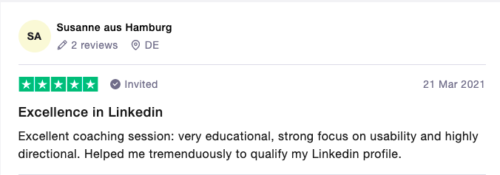LinkedIn / Resumes and Executive Search – Live Webinar & Q+A (April 22 & 23 – free for all GatedTalent members!)
Join us live for these dynamic discussions and Q+A on executive careers. You’ll hear from Nationally Certified Resume Writer, Natalie Hodencq and Nationally ...

GatedTalent Features on Top HR Publication!
We were delighted to see GatedTalent referenced in HR.com’s Talent Acquisition Excellence publication, talking about why search firms rarely advertise, and how our ...

GatedTalent sponsored The World Executive Search Congress in 2023
GatedTalent took great pride in its role as a sponsor for the World Executive Search Congress, providing an excellent opportunity to showcase our ...

GatedTalent to sponsor The World Executive Search Congress 2023
We are delighted to announce that GatedTalent is a Silver Sponsor of the World Executive Search Congress 2023. Taking place virtually on October ...

FREE WEBINAR ON JAN 11 & 13: How to build your LinkedIn profile to be found by Recruiters
How To Get Spotted By Recruiters on LinkedIn – January 11 & 13 Join us for a FREE webinar usually reserved for GatedTalent ...

FREE WEBINAR ON NOV 21: How to build your LinkedIn profile to be found by Recruiters
How To Get Spotted By Recruiters on LinkedIn – Monday, November 21 USA: 9 AM Pacific Time / 11 AM Central Time / ...

How to get spotted by recruiters
So, you have a LinkedIn profile and a résumé – but you are still not hearing from recruiters. Why is that? 72% of ...

GatedTalent New Year Offers
Happy New Year! To help you achieve your career goals in 2022, we are delighted to offer the following discounted rates for our ...

New Career Documents for 2022?
Check out our updated service offerings – learn more about our LinkedIn profile optimization and professional CV services!

Thank you!
We would like to take this moment to show our gratitude to all our GatedTalent members and clients. Each of our services are ...

×


Upload Resume
Recruiters across the globe used Talentis and GatedTalent to find candidates for board, executive, leadership and professional rules. Increase your chances of success by uploading and sharing your resume with our recruiter clients!










